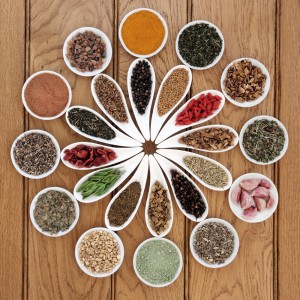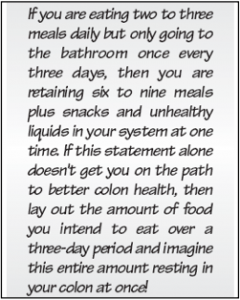Are you plagued by digestive problems, gas and/or bloating, migraines, allergies, depression, constipation, skin problems, high cholesterol, nausea, or a weight problem that doesn’t improve no matter what you eat? Perhaps the blame can be placed on two unromantic areas of the body: the liver and large intestines.

The problem starts with incomplete elimination. Yes, I know you insist that you eliminate once every day “right on schedule.” Even if you have one or more bowel movements a day, you may still be constipated.
If you are leaving fecal matter along your colon walls because you don’t eat enough fiber, this is considered constipation. Remember constipation is really a lack of elimination of all fecal matter that passes through your colon from the food that you ate in the previous meals.
Perhaps you have the opposite problem: diarrhea. Diarrhea is the worst form of constipation! With diarrhea, the body liquefies the waste in a desperate attempt to move it through a congested bowel. Diarrhea is a sure sign of constipation.
 A real clue as to whether this might be your problem is to evaluate whether or not you have a “pot-belly.” A pot-belly is a true indicator of incomplete elimination and poor liver function.
A real clue as to whether this might be your problem is to evaluate whether or not you have a “pot-belly.” A pot-belly is a true indicator of incomplete elimination and poor liver function.
Decreased bile flow and a sluggish bowel elimination, not dietary cholesterol, is the true culprit in high cholesterol. By increasing the amount of soluble fiber in the bowel, which both cleanses the bowel and binds itself to bile acids, a positive effect is seen on the cholesterol level. No longer is there an excessive reabsorption of bile acids and toxins from the bowel. Furthermore, the body must pull cholesterol from the blood to make more bile acids, resulting in a lower cholesterol level.
The body, in its innate wisdom, does everything it can to keep the bloodstream free of toxins, primarily through the detoxifying action of the liver. All blood from the intestinal tract is routed first to the liver, which does its best to filter the toxins out of the blood by dumping them into the bile. The bile, which is made from cholesterol, is then secreted into the intestinal tract to help digest fats. The liver and bile route can handle a certain quantity of toxins before becoming overwhelmed; however, in the pot-bellied individual the liver and bile route never get a break! The bile route becomes congested, and toxins then circulate systemically, reaching all the organs in the body. Systemic auto- intoxication results.
Pot-bellied individuals are 600% more likely to have high cholesterol levels and heart disease than their counterparts with flat abdomens. This is a direct result of autointoxication. Because the liver and bile route are congested, the body has no way of controlling cholesterol; the cholesterol elevates at the same time toxins circulate systemically. Coronary heart disease is a direct result of this scenario, created relatively independent of dietary cholesterol consumption. (pp.22-23, Flatten Your Stomach with a New Slant! by Dr. William F. Welles)
What, then, is the solution? Daily bowel cleansing (forever, if you wish to prevent a recurrence of this problem, unless your diet is perfect-you eat like you live in the Garden of Eden and contains zero processed foods) and liver cleansing and building just may help you feel like a kid again!
BOWEL CLEANSING
1. There are many great bowel cleanses out there. Of course, when you are cleansing, you want to make sure you purchase it from a quality retailer so that what you are using is free of pesticides and other contaminants. A two-week cleansing program can support natural waste elimination to provide a sense of improved energy and well-being. Here are some ingredients you can commonly find in cleanses: Psyllium hulls provide fiber and absorb bowel toxins. Highly absorbent bentonite clay is often used to support colon health. Aloe vera juice soothes bowel tissue. Chlorophyll helps prevent odor and counteracts bowel toxins. The following herbs are used to cleanse the body of many common environmental pollutants and support liver function: burdock root, dandelion root, fenugreek seed, ginger rhizome, pepsin, red clover flowers, yellow dock root, marshmallow root extract, sarsaparilla root extract, Bacillus coagulans, cascara sagrada bark, and milk thistle seed extract. It is also common to find laxative herbs in a cleanse. Herbs that are protective, gentle and soothing herbs to enhance elimination, increase production of digestive enzymes and soothe the digestive tract. Here are some examples: cascara sagrada bark, buckthorn bark, licorice root, capsicum fruit, ginger rhizome, Oregon grape root and rhizome, Turkey rhubarb root, couch grass rhizome and red clover flowers.
2. Probiotics help maintain and replenish intestinal supply of good bacteria. These microorganisms perform essential functions in the body and are affected by aging, adverse intestinal pH, microbial interactions, environmental and dietary temperatures, stress, physiological factors, peristalsis, bile acids, host secretions and immune responses. Probiotics are live microorganisms that exert many beneficial health effects. Among other things, they support digestion, promote immunity and aid in the elimination of toxins. Probiotics also help regulate intestinal functions and can greatly support colon function. Clinical studies have shown that short- and long-chain fructo-oligosaccharides (FOS) may improve growth of friendly microorganisms, enhance mineral absorption, support bowel health and function, and promote immune function.
Probiotics Commonly found in the digestive system:
Lactobacillus rhamnosus, Bifidobacterium bifidum, L. acidophilus, L. brevis, L. bulgaricus, L. plantarum, Streptococcus thermophilus, B. infantis, B. longum, L. casei, L. salivarius and FOS (short- and long-chain).
3. STRESS – Have you ever heard someone say “What is your gut feeling?” 95% of your neurotransmitters are found in your gut so diarrhea or constipation can be a reaction to stress. The following herbs can support stress accompanied by diarrhea or constipation: Passionflower is a natural support to relaxation centers of the nervous system and has been used historically to help with restlessness. Calming and soothing, it doesn’t affect mood or orientation. Fennel has long been known to strengthen the digestive system, where emotional stress is most likely to center. Feverfew is an aromatic herb able to help the body deal with muscular tension. Hops is considered a tonic herb and is especially recognized for promoting sleep and helping the body deal with occasional restlessness. It also benefits the digestive system, thereby helping to prevent intestinal stress from undigested food. Chamomile is known for supporting nerve health and mental alertness. It also aids digestion and helps with circulation. It is soothing with no harmful side effects. Marshmallow has demulcent effects on the digestive tract. It has been historically used for the respiratory support and to soothe mucous membranes.
 Healing can occur naturally in the body if it is given what it truly needs. Eli English is a Certified Naturopath Coach and owner of The Herb Shop By The Square in Marietta, Georgia. She uses homeopathy, herbs and biofeedback to help reduce stress, detoxify, manage pain, improve mental abilities and enhance the quality of life. Eli English’s goal is to empower through coaching so you can make informed decisions about your own life and health care. The level of attention, personalization and passion for natural health that Eli provides is unlike any other. More information about Eli English here.
Healing can occur naturally in the body if it is given what it truly needs. Eli English is a Certified Naturopath Coach and owner of The Herb Shop By The Square in Marietta, Georgia. She uses homeopathy, herbs and biofeedback to help reduce stress, detoxify, manage pain, improve mental abilities and enhance the quality of life. Eli English’s goal is to empower through coaching so you can make informed decisions about your own life and health care. The level of attention, personalization and passion for natural health that Eli provides is unlike any other. More information about Eli English here.



